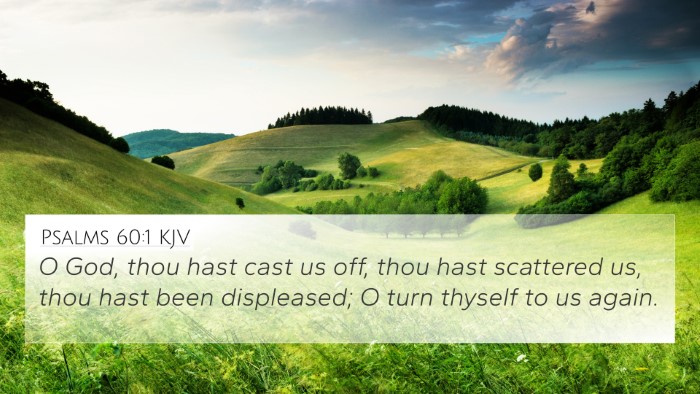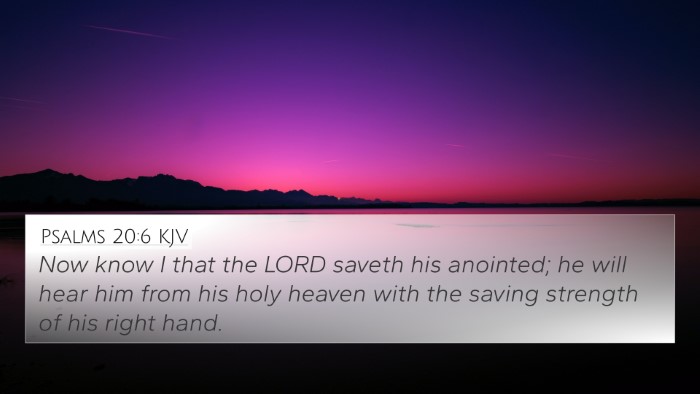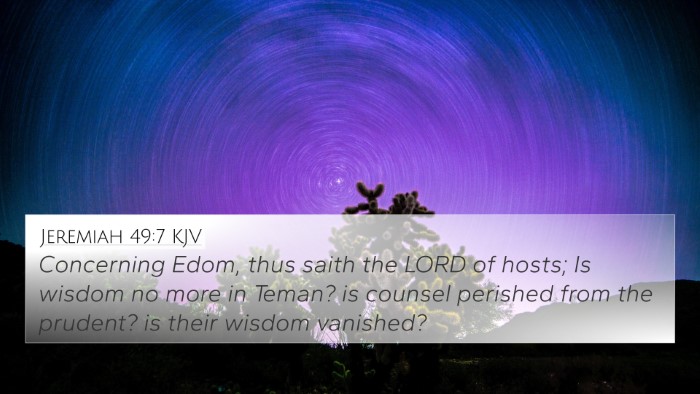Understanding Psalms 108:10
Psalms 108:10: "Who will bring me to the strong city? who will lead me unto Edom?"
Summary of Meaning
The verse expresses a cry of the psalmist seeking deliverance and guidance in times of distress. It reflects a moment of uncertainty and a call for divine help in overcoming obstacles, particularly those posed by the stronghold of Edom, which stands as a metaphor for adversaries.
Insights from Biblical Commentaries
This verse is often examined through the lens of various commentaries:
-
Matthew Henry's Commentary: Henry emphasizes the context of this verse as a plea for assistance against powerful enemies. He notes that Edom symbolizes not just a geographical territory but also the hostile forces that oppose God's people. The psalmist acknowledges his need for divine intervention, indicating that true strength and guidance come from God alone.
-
Albert Barnes' Notes: Barnes interprets the verse as an expression of doubt regarding human capability in confronting formidable foes. He suggests that the mention of a "strong city" signifies the challenges that seem insurmountable without God's aid, highlighting the necessity of faith in the face of difficulties.
-
Adam Clarke's Commentary: Clarke expands on the themes of strength and community, noting that the question posed reflects a longing for collective strength in battle. Furthermore, he sheds light on the importance of leadership, both human and divine, indicating that the psalmist seeks someone to guide him in achieving victory over enemies.
Thematic Connections and Cross-Referencing
There are numerous Bible verse cross-references that resonate with the themes found in Psalms 108:10. These connections bolster the understanding of divine assistance and human vulnerability:
- Psalms 60:9: "Who will bring me into the strong city? who will lead me unto Edom?" - a direct parallel that reinforces the plea for help.
- Isaiah 41:10: "Fear thou not; for I am with thee: be not dismayed; for I am thy God: I will strengthen thee; yea, I will help thee." - emphasizing God's promise of support.
- Philippians 4:13: "I can do all things through Christ which strengtheneth me." - illustrating the idea of drawing strength from God.
- 2 Corinthians 12:9: "My grace is sufficient for thee: for my strength is made perfect in weakness." - acknowledging human frailty while relying on divine strength.
- Psalm 121:1-2: "I will lift up mine eyes unto the hills, from whence cometh my help. My help cometh from the Lord, which made heaven and earth." - stressing the source of help and guidance.
- Proverbs 3:5-6: "Trust in the Lord with all thine heart; and lean not unto thine own understanding." - an encouragement to seek God's guidance in all circumstances.
- Psalms 27:1: "The Lord is my light and my salvation; whom shall I fear? the Lord is the strength of my life; of whom shall I be afraid?" - conveying confidence in God as a protector and guide.
- Romans 8:31: "What shall we then say to these things? If God be for us, who can be against us?" - an affirmation of God's support against adversaries.
- Hebrews 13:6: "So that we may boldly say, The Lord is my helper, and I will not fear what man shall do unto me." - reinforcing the assurance of divine help.
- Matthew 28:20: "And, lo, I am with you alway, even unto the end of the world." - a promise of Christ's eternal presence and assistance.
Conclusion
The inquiry posed in Psalms 108:10 encapsulates the human condition in times of crisis—an acknowledgment of strength needed beyond oneself. The psalmist's plea serves as a powerful reminder of the importance of seeking God for guidance and support in confronting life's challenges. Understanding this verse through the lens of various Biblical commentaries enriches our appreciation of its meaning and encourages us to explore the intricate web of connections that exist between Bible verses.
Additional Resources for Cross-Referencing
For those interested in delving deeper into the themes and connections within the scriptures, consider using tools for Bible cross-referencing, such as:
- Bible concordance for locating references and themes.
- Bible cross-reference guide for understanding connections between verses.
- Cross-reference Bible study to enhance your understanding of scripture.
- How to use Bible cross-references for personal study and sermon preparation.
- Bible reference resources and Bible chain references for systematic study.







